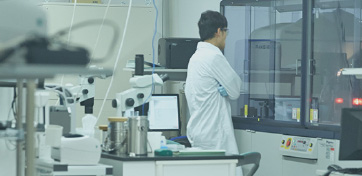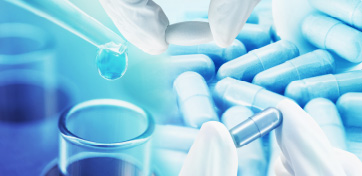
INTRODUCTION OF
THE DEVELOPMENT DEPARTMENT
Job Description
In clinical development, a clinical development protocol is created to evaluate the efficacy and safety of candidate pharmaceutical products generated through drug discovery research in patients. In addition, in order to obtain approval and to market these as new pharmaceutical products, clinical studies are conducted in accordance with Good Clinical Practice (GCP) (*1) and other standards, and topics such as the administration method, dosage and administration, and precautions for use are investigated and discussed. The mission of clinical development is to develop an efficient and reliable clinical evaluation plan and clinical protocols appropriate for each candidate pharmaceutical product, to ensure that clinical studies are conducted together with healthcare professionals, to compile and evaluate clinical study data, and to apply for approval licenses for manufacturing and marketing.

Early Development / Clinical Operations
Early Development / Clinical Operations are the departments in charge of generating clinical data, mainly in patients, during pharmaceutical research and development activities. These departments are responsible for planning and conducting clinical studies (clinical trials) intended to evaluate and confirm the efficacy and safety of investigational products in patients.
Overview
A new pharmaceutical product candidate selected based on the results of non-clinical studies is first investigated in a small number of healthy volunteers in Phase I clinical studies to evaluate the safety and pharmacokinetics in humans. If safety in humans is confirmed and the clinical dose is estimated based on pharmacokinetic data from Phase I studies, clinical studies in actual patients can be conducted.
Usually, safety and efficacy are evaluated and the optimal dosage and administration are investigated in the Phase II studies in patients. The results obtained in the Phase II studies are confirmed through comparisons with a control drug (an existing drug for the same indication or a placebo) in the Phase III studies.
In addition to conducting appropriate clinical studies in compliance with GCP* guidelines, Early Development / Clinical Operations are in charge of key tasks, such as evaluating the efficacy and safety data of new pharmaceutical products and their risks and benefits, which are the core data for applications for drug approval to be submitted to the Ministry of Health, Labour and Welfare (MHLW). Moreover, clinical studies are supported by patients providing voluntary consent for participation and cannot be conducted without the understanding and cooperation of physicians, nurses, pharmacists, laboratory technicians, and clinical research coordinators (CRCs) at medical institutions. For this reason, the team in charge of clinical development is always required to act responsibly to gain the trust of the parties involved in clinical studies.
Recently, we have also been conducting multi-national clinical trials that make it possible to apply for approval globally at almost the same time and, thus, we share information with overseas research and development divisions, collaborate with each of these divisions to ensure efficient research and development, and aim to deliver innovative new pharmaceutical products to patients around the world as early as possible.
*GCP (Good Clinical Practice)
The MHLW Ordinance on Good Clinical Practice. In conducting clinical studies (clinical trials), protecting study participants (human rights and safety) and ensuring the reliability of clinical study data (quality and results) are essential, and this is why "Good Clinical Practice (GCP)" was established
Structure of the departments
The division is divided into two departments according to therapeutic area to enhance global collaboration, flexibility and efficiency of resource management within clinical development functions, as well as to develop new pharmaceutical products in various therapeutic areas by increasing expertise.
Moreover, we have recently been involved in the development of Astellas’ Rx+ project, contributing to the creation of new healthcare solutions that go beyond pharmaceutical product development.
Early Development
From Phase 1 studies to eary Phase 2 studies (initial evaluation on whether investigational product shows expected safety and efficacy), and clinical pharmacology studies including Phase 1 healthy volunteer studies, drug-drug interaction study, clinical studies in patients with renal or hepatic impairment, etc.
Clinical Operations
Late Phase 2 studies and Phase 3 studies, and also all clinical studies in Rx+® projects
A few words from the Department Head
The mission of pharmaceutical companies is to provide better pharmaceutical products to patients who are fighting diseases. Early Development and Clinical Operations are the departments in charge of the planning, design, and conduct of clinical studies at the final stage of new pharmaceutical product development, and this is where we realize that investigational products can help patients worldwide treat their diseases.
On the other hand, it is necessary to advance the clinical studies while sufficiently paying attention to safety and quality. Thus, each member is required to act based on high ethical standards and scientific grounds. It comes with heavy responsibilities, but is also a very rewarding job.
"Deliver much-needed medications to patients as early as possible"
"For the patients and for us"
These are the slogans we live by, and the principles that guide our daily challenges.
Our departments are global organization, so we are executing global clinical studies in collaboration with the US and Asian colleagues. There are many opportunities to work with global roles and responsibilities. If you wish to contribute to the health of people around the world, are full of passion, want to be able to work actively in a global setting, and have a strong spirit for taking on challenges, we hope you will join us. We look forward to receiving your application.
Development Project Management
The Development Project Management is a division that globally manages clinical development projects for new drug candidates from the company's own research institute, or partner companies or research institutions, to get approval in countries all over the world with the optimized clinical development strategy and plan. We contribute to making clinical development strategies and plans for development projects, and manage schedules, budgets, and risks through close communication and collaboration with key stakeholders in Japan, Asia, the United States, and Europe. We advance the development of new pharmaceutical products in an optimal way by timely capturing and reflecting changes in the environment surrounding individual development projects, as well as associated risks.
Overview
In order to deliver possible new pharmaceutical product candidate compounds and modalities to patients around the world as quickly as possible, we support the advancement of development projects as project managers in collaboration with various internal stakeholders including Early Development / Clinical Operations, Research, Pharmaceutical Technology, Commercial & Marketing, Medical Affairs, Regulatory Affairs, and Pharmacovigilance, and other internal stakeholders as well as external stakeholders.
The project manager gets involved in and contributes to making the clinical development strategy and plan for the clinical development projects as a member of the Global Development Project Team. The team considers strategies and plans from various perspectives addressing what package of clinical studies will be conducted based on patient population, geography and timing. The strategy and plans proposed by the team are implemented by the team as a development plan after internal governance approval.
In order to implement the development plan, it is necessary to appropriately manage the progress and budget. In general, any development project has the risk of not moving forward as expected and planned. Therefore, risk management is an important element for the smooth advancement of a project.
The Development Project Management works and collaborates with members of various divisions in various regions to appropriately and promptly advance development projects based on optimal development plans that align with development strategies, thereby contributing to the timely delivery of necessary medical care to patients.
Divison features
The Development Project Management consists of the following two groups:
Project Management Group 1
This group is responsible for the project management of development projects in areas other than oncology, such as immunity, transplantation, gene & cell therapy, neuromuscular diseases, ophthalmology, and gynecology.
Project Management Group 2
This group is responsible for the project management of development projects in the oncology area (immuno-oncology development, oncology development).
A few words from the Division Head
The environment surrounding pharmaceutical product development is constantly changing on a global basis. The function of project management is extremely important in making optimal clinical development plans for new drugs, and executing these plans efficiently and quickly with preemptive approaches in which we anticipate environmental changes.
Innovative new drugs and therapies cannot be delivered to patients and healthcare professionals who need them as soon as possible unless development strategies and plans are appropriate and risk management is implemented properly. In addition, many stakeholders are involved in pharmaceutical product development. Development is not successful if individual stakeholders simply bring their parts together. The project manager plays a pivotal role together with the project leader in leading the team, ensuring alignment by connecting stakeholders and bringing the team together to move towards a common goal.
The Development Project Management looks at development projects from a comprehensive perspective, draws out the expertise and strengths of individual stakeholders appropriately, and organically connects and facilitates collaboration with each stakeholder to generate synergies, creating more optimal development strategies and plans, and globally managing and executing development plans that appropriately capture the risks.
For those who have passion willing to contribute and challenge to providing patients with new drug and treatment option as quick as poosible by promoting the efficiency of clinical development of new drug through connecting people globally, please consider joining us.
Data Science
Data Science is in charge of the series of activities from clinical development planning to the development of clinical study protocols, design the case report forms and develop the database, data collection, cleaning and reviewing collected data, data processing for data analysis, data analyses, evaluation, and preparation of reports. In addition, we work to standardize statistical analysis plans, analysis datasets, and case report forms globally to support and promote each activity in clinical studies, as well as methods of globally managing clinical data, etc., and plan, maintain, and manage the tools used.
Overview
The activities of each group within the division are as follows:
Data Management (DM)
This group is in charge of designing and developing database for case report forms and eCOA, cleaning, reviewing and central monitoring of collected data, user account management, planning, maintenance, and management of clinical data management tools, global standardization of clinical study data (CDISC support), and quality control to ensure the quality and reliability of clinical data. These are highly important tasks in the quality control of clinical data globally as the data is one of the major assets of a pharmaceutical company. In October 2024, some data management-related tasks, bsuch as database programming, were transferred to Clinical Data Enablement.
Statistical & Real World Data Science (SRS)
This group is responsible for the statistical issues associated with the design, conduct, analysis, evaluation, and reporting of clinical studies. In particular, making full use of statistical knowledge to scientifically develop study protocols, such as a review of designs and sample size calculations, is important to enable the rapid and efficient development of new pharmaceutical products and to collect data that enable clear decision making. It is also necessary to leverage real world data and to create valuable information via epidemiological viewpoint. In addition, when carrying out projects in collaboration with Europe, the United States, and Asia, highly specialized activities also include discussing the statistical analysis and exchange of data in consideration of cutting-edge knowledge and regulations.
Medical Writing (MW)
This group is responsible for document production required for the development of pharmaceutical products and medical devices and for regulatory submissions. Specifically, we mainly prepare documents related to clinical studies, such as documents intended for submission to start clinical studies, clinical study protocols, Investigator's Brochures and clinical study reports, and documents for new drug application. We also prepare documents for post-marketing survey study and for clinical study information disclosure. These are highly specialized tasks to prepare accurate and scientifically valid documents to appropriately include necessary information in accordance with the type and purpose of the documents.
Data Sciences Business Operations Management (BOM)
This group supports coordination with external service providers to facilitate DM, statistical analysis, and MW activities. In addition, we support the adjustment of budgets, resources, establishment of workplace environments and infrastructure, etc. in order to smoothly promote various operations in the division. These are highly important activities that promote accurate, agile, and efficient execution of operations related to data sciences.
Clinical Data Enablement (CDE)
This group was launched in April 2023 with SMEs in data management and statistical analysis solutions, and in October 2024 some data management-related tasks, such as database programming, were added. SMEs have the vision to drive optimal use of systems and data flow, drive innovation, further automation, adoption of AI solutions.
Department features
There are five groups in Data Science: DM, SRS, MW, BOM and CDE. These groups are in charge of an important part of the operations in clinical studies; to plan, conduct, evaluate, and report.
In addition to responsibilities in clinical studies, DM and SRS are in charge of standardizing various documents, process, clinical data and analysis data globally. MW uses a globally document management system to create and manage documents using a global standard format and writing guides created for each document type. Data Science is woking globally in collaboration between regions.
Message from the Division
Pharmaceutical industries are globalized rapidly. Global utilization of clinical study data is progressing steadily. As a member of Astellas, it is important to manage, analyze, evaluate, and report clinical data globally and efficiently. To this end, we are promoting the global standardization of operating procedures and implementing standard tools.
This division gives many opportunities to interact with people within and outside Japan and the company, and to acquire and utilize highly specialized skills, enabling employees to demonstrate a wide range of abilities. Improving our expertise is a given; however, since we are in this age of change and rapid progress, it is important to always try to adapt to change and incorporate reforms. To do this, it is important to be agile, consider various ideas and think about the best approach.
Furthermore, communication is important in carrying out our work globally. It is necessary to acquire English skills and to understand each culture and environment in order to communicate with each other. Thus, the expectation is that members will actively and positively deal with the overall situation.
Early Development (Clinical Pharmacology Function)
ED Clinical Pharmacology develops and implements early clinical development strategies and clinical pharmacology study plans, develops translational research plan, plan the strategic use of biomarkers, develop companion diagnostics and conducts Modeling & Simulation of study data (Model Informed Drug Development), to optimize the dosage and administration of pharmaceutical product candidates and make early informed decision for projects.
Overview
Early Development (Clinical Pharmacology Function)
ED Clinical Pharmacology develops and implements early clinical development strategies and clinical pharmacology study plans, develops translational research plan, plan the strategic use of biomarkers, develop companion diagnostics and conducts Modeling & Simulation of study data (Model Informed Drug Development), to optimize the dosage and administration of pharmaceutical product candidates and make early informed decision for projects.
ED Clinical Pharmacology is composed of the following groups
Oncology Clinical Pharmacology: Develop a clinical pharmacology strategy for oncology project.
Biopharma Clinical Pharmacology / Cell Gene Therapy: Develop a clinical pharmacology strategy for non-oncology project and cell/gene therapy project.
Translational Medicine: Develop plan and conduct translational medicine in collaboration with non-clinical research group and utilize the strategic application of biomarker research.
Precision Medicine: Develop plan for companion diagnostics for personalized medicine.
New Technology: Conduct mechanistic modeling (QSP, PBPK) and implement new computational technology (AI, ML) for MIDD.
Pharmacometrics: Conduct and plan Population PKPD analysis for dose optimization and develop MIDD.
Department features
Early Development Clinical Pharmacolgy is a global organization mainly in the US and Japan that contributed to drug research and development under the leadership of the global ED head. Various clinical pharmacology studies are conducted in the most appropriate region. On the other hand, the output from clinical pharmacology should be consistent and standardized across regions. For this reason, the members of ED Clinical Pharmacology are always working globally beyond regions.
Message from the Division
Early Develpment Clinical Pharmacology has contributed to early informed decision making, appropriate patient selection, and optimizing the dosage and administration of pharmaceutical product candidate compounds. We incorporate innovative ideas and technologies into pharmaceutical product development in order to "turn innovative science into VALUE for patients." The external environment is rapidly changing, and the range of activities is expanding across the world. We maintain a high level of scientific literacy and ethics, and work daily with Astellas Group colleagues around the world to develop pharmaceutical products. Let's take on the challenge together for patients around the world who are looking forward to innovative new pharmaceutical products.
The Development related functions includes "Immuno-Oncology Development", "Oncology Development", "BioPharma and Ophthalmology Development", "Development Project Management", "Early Development," "Clinical Operations", and "Data Science". These organizations work together with overseas development hubs (United States, Asia) to promote global pharmaceutical product development in accordance with their respective functions and roles.
-
Early Development / Clinical Operations
Early Development / Clinical Operations are the departments in charge of generating clinical data, mainly in patients, during pharmaceutical research and development activities. These departments are responsible for planning and conducting clinical studies (clinical trials) intended to evaluate and confirm the efficacy and safety of investigational products in patients.
VIEW MORE -
Development Project Management
The Development Project Management is a division that globally manages clinical development projects for new drug candidates from the company's own research institute, or partner companies or research institutions, to get approval in countries all over the world with the optimized clinical development strategy and plan.
VIEW MORE -
Data Science
Data Science is a division in charge of the series of activities in clinical studies from study-start, study-conduct to study-close. In addition, we are in charge of managing global standards, as well as planning, maintaining and managing system and tools to support and promote each activity in clinical studies.
VIEW MORE -
Early Development (Clinical Pharmacology Function)
ED Clinical Pharmacology develops and implements early clinical development strategies and clinical pharmacology study plans, develops translational research plan, plan the strategic use of biomarkers, develop companion diagnostics and conducts Modeling & Simulation of study data (Model Informed Drug Development), to optimize the dosage and administration of pharmaceutical product candidates and make early informed decision for projects.
VIEW MORE
Work Location
-
Headquarters (Tokyo, Japan)
Access Map






